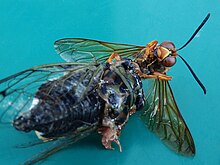fr
noms dans le fil d’Ariane


Cicada killer wasps (genus Sphecius) are large, solitary, ground-dwelling, predatory wasps. They are so named because they hunt cicadas and provision their nests with them, after stinging and paralyzing them. Twenty-one species worldwide are recognized. The highest diversity occurs in the region between North Africa and Central Asia.
In North America, the term "cicada killer wasp" usually refers to the most well-known species, the eastern cicada killer (S. speciosus). A few other related genera also are sometimes referred to as "cicada killers", e.g. Liogorytes in South America and Exeirus in Australia.
The use of cicadas as prey is in keeping with the typical behavior of the tribe Gorytini, which tend to specialize on various members of the Cicadomorpha as prey items.

This list of species is probably complete as of March 31, 2009. It has been adapted from the Catalog of Sphecius species (California Academy of Sciences). Notable subspecies are also given.
More recently, it has been suspected that the western cicada killer (S. grandis) represents more than one species. Also, some evidence suggests that either the eastern cicada killer (S. speciosus) has a subspecies or closely related species that mimics the Pacific cicada killer (S. convallis). Alternatively, when they were already well distinct species, significant hybridization has occurred between them, though not enough to fully overcome their reproductive isolation.[1]
Cicada killer wasps (genus Sphecius) are large, solitary, ground-dwelling, predatory wasps. They are so named because they hunt cicadas and provision their nests with them, after stinging and paralyzing them. Twenty-one species worldwide are recognized. The highest diversity occurs in the region between North Africa and Central Asia.
In North America, the term "cicada killer wasp" usually refers to the most well-known species, the eastern cicada killer (S. speciosus). A few other related genera also are sometimes referred to as "cicada killers", e.g. Liogorytes in South America and Exeirus in Australia.
The use of cicadas as prey is in keeping with the typical behavior of the tribe Gorytini, which tend to specialize on various members of the Cicadomorpha as prey items.